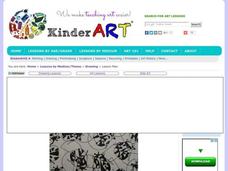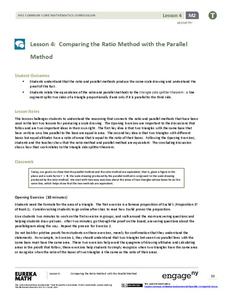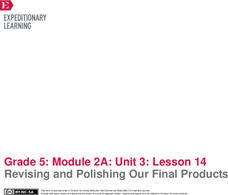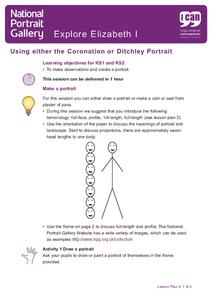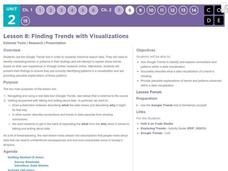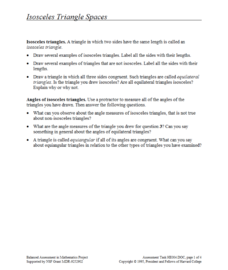Curated OER
Fighting Fake News
Fake news. Alternative facts. Internet trolls. In an age of Newspeak, it's increasingly important to equip 21st century learners with the skills needed to determine the legitimacy of claims put forth on social media, in print, and in...
Curated OER
Creating Historians: Giving Scholars the Answers
How allowing index cards on tests can empower critical thinking; part one of a series on approaching social studies as a group of historians.
Curated OER
Doodles
Here is a fun drawing activity that is sure to develop listening, shape recognition, drawing, skills and eye-hand coordination. The class doodles over an entire page based on the instructions they are given. This resource includes...
EngageNY
Changing Scales
Pupils determine scale factors from one figure to another and the scale factor in the reverse direction. Scholars compute the percent changes between three figures.
Curated OER
Positive/Negative Bugs
Bugs can be creepy - and fun! Kids create a positive and negative design by repeatedly drawing a simple insect overlaid with a geometric shape. The outcome is really neat and will help build spacial reasoning, visual acuteness,...
Mathematics Vision Project
Module 5: Modeling with Geometry
Solids come in many shapes and sizes. Using geometry, scholars create two-dimensional cross-sections of various three-dimensional objects. They develop the lesson further by finding the volume of solids. The module then shifts...
Curated OER
Shaded Bottles
Learners draw, and then paint three-dimensional bottles to practice shading which shows shape and perspective. The step-by-step process for creating dimensional still life art is outlined, which makes teaching art an attainable task. Oil...
Code.org
Canvas and Arrays in Apps
Scholars learn how to make a digital canvas and fill it with artwork by creating a drawing app using the canvas element. The activity requires learners to previous knowledge of arrays and return commands to draw images.
K12 Reader
Describe It with Adjectives
Put children's descriptive writing skills to the test with these fun collaborative writing activities. Presented with the picture of an object, young writers are are tasked with creating a description that provides enough detail for...
PHET
Features of the Sun
There are so many things to discover about the sun! Pupils discuss their knowledge of the sun, explore its features, apply their knowledge by labeling photographs, and then reflect on their learning by working in groups to draw and label...
EngageNY
Comparing the Ratio Method with the Parallel Method
Can you prove it? Lead your class through the development of the Side Splitter Theorem through proofs. Individuals connect the ratio and parallel method of dilation through an exploration of two proofs. After completing the proofs,...
EngageNY
Revising and Polishing Our Final Products
One, two, three go! Scholars work independently to finalize the three components of their final task. They complete a science journal entry, scientific text box, and scientific drawing. While working, learners sign up for an...
Lakeshore Learning
Fun in the Snow
Celebrate the arrival of winter with a reading of Jack Ezra Keats' book The Snowy Day. Engaging children by asking them about their own experiences in the snow, the teacher goes on to read the story...
National Portrait Gallery (UK)
Explore Elizabeth I
Keen observation skills are an essential trait for good artists. Discuss the elements of a portrait with your class using terminology such as, full-face, profile, quarter-length, full-length. After that, they can use the included...
Curated OER
The Water Cycle (Evaporation, Condensation, Precipitation)
The 3 steps of the water cycle, evaporation, condensation, and precipitation, are the focus of this lesson. After a neat demonstration of rain using hot water, a pie tin, and ice cubes, young scientists observe and discuss the elements...
Ford's Theatre
How Perspective Shapes Understanding of History
The Boston Massacre may be an iconic event in American history, but perhaps the British soldiers had another point of view. Using primary sources, including reports from Boston newspapers and secondary sources from the British...
National Institute of Open Schooling
Atomic Structure
Learners explain historical findings such as Rutherford and Bohr's contributions, explain wave particle duality, and formulate Heinsenberg's uncertainty principle. They also draw s, p, and d orbitals, explain more historical findings,...
Virginia Department of Education
Weather Patterns and Seasonal Changes
Get your class outside to observe their surroundings with a lesson highlighting weather patterns and seasonal changes. First, learners take a weather walk to survey how the weather affects animals, people, plants, and trees during...
Code.org
Finding Trends with Visualizations
Pupils often hear about trends, but they don't always see them. The eighth lesson in a unit of 15 requires individuals to use the Google Trends tool. Class members identify patterns in the visualization before presenting the patterns...
Charleston School District
3D Applications of the Pythagorean Theorem
How many right triangles can you find in a prism, cone, or pyramid? Using right triangles to find lengths in three-dimensional figures is the focus of the lesson. After working with the Pythagorean Theorem to find missing side...
Balanced Assessment
Triangle in Circle
Even kindergartners can draw triangles in circles, but the assessment task requires a bit more geometric knowledge. Scholars investigate triangles that have a diameter of a circle as one of its sides. They must consider triangles that...
Concord Consortium
Isosceles Triangle Spaces
How many different types of triangles can your class name? A discovery lesson guides learners through an exploration of the different triangle types and the relationships between their angles and sides. Using coordinate geometry,...
Notion
Popplet
Add color to the mind-mapping process! Users double tap to create a bubble and everything flows quickly from there as they drag, draw, type, and more.
Shodor Education Foundation
Marbles
Grab some marbles from a bag. The applet simulates drawing marbles from a bag. Pupils determine the number of four colors of marbles in a bag and how many marbles to draw. Using information on whether order matters in the draw and if...




